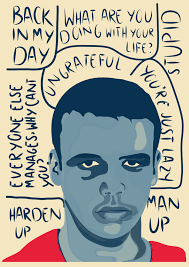Every minute, the world loses a man to suicide. According to the World Health Organisation, over 700,000 people die by suicide each year, and more than 75% of them are men.
These aren’t just numbers—they are sons, husbands, brothers, classmates, and colleagues—silenced not by choice, but by a culture that equates emotion with weakness, especially in Nigeria and many African countries. This pressure starts early and runs deep.
“Man up!”
“Real men don’t cry.”
“Is that how a man behaves?”
These aren’t just passing comments. They’re scripts engraved on the hearts of boys and men from childhood, shaping how they show up in the world. In many African households, stoicism is worn like a badge of honour, while vulnerability is seen as shameful, but the consequences of this conditioning are deadly.
The Unspoken Rule: Where “Being a Man” Means Saying Nothing
In African cultures, proverbs like “Boys don’t cry” aren’t just sayings, they’re survival codes. Boys are told to “hold it in,” “toughen up,” and “deal with it like a man.” The result? Many grow up believing emotions are liabilities.
However, when emotion is suppressed, pain doesn’t vanish—it festers. Psychologists call it restrictive emotionality—a limited range of emotional expression that compels men to suppress rather than process their feelings.¹ Men, trained to hide their sadness, often express distress through anger, irritability, reckless behaviour, or chronic physical symptoms.² So, when a man drives recklessly, drinks excessively, or “zones out” emotionally, it’s not just vibes. It’s often unspoken pain, and too often, this pain ends in silence or suicide.
When “I’m Fine” Isn’t Fine: The Real Cost of Hiding Pain
In Nigeria, men are over twice as likely to die by suicide as women.³
Why? This is because help-seeking has been branded as weakness. Men are rarely taught to recognise the signs of emotional strain. Instead, they normalise suffering:
- “I just need to be strong.”
- “I’m a man.”
- “It is well!”
Nevertheless, prayer without processing becomes a mask, and untreated mental health struggles don’t disappear; they morph into depression, burnout, rage, and isolation. Since emotional pain doesn’t always look like crying, it often shows up as sleeplessness, body aches, reckless living, or quiet withdrawal. Unfortunately, healthcare providers sometimes miss it because it doesn’t look like the “usual” symptoms. This is how thousands of men fall through the cracks—misunderstood, misdiagnosed, and eventually lost.
In 2015, Nigeria recorded a male suicide rate of 13.1 per 100,000, with more than 12,600 men ending their lives that year alone.³ This is not just a statistic, it’s a silent epidemic of unmet emotional needs.
Being Heard: How Honest Conversations Support Healing
Real strength isn’t about bottling things up but about choosing healing over hiding. Healing starts when men see that vulnerability is not weakness, but wisdom. It happens in:
- Peer conversations where guys talk without shame.
- Men’s support groups, from men’s circles to barbershops.
- Therapy sessions, led by counsellors who understand local contexts.
- Online communities where men speak their truths and listen to others.
When men see others like them opening up, it creates permission for them to do the same. Peer vulnerability normalises the healing process. It tells men that seeking help isn’t a sign of weakness, it’s a sign of strength. It’s brave.
Men are more likely to open up in environments where they feel safe and understood. That’s where the community-level initiatives come in—safe spaces like men’s circles, church groups, barbershop talks, or relatable online forums. These are the places where emotional walls begin to come down.
As men begin to process their emotions in these spaces, the reluctance to seek professional help fades. Over time, emotional suppression tied to cultural masculinity is replaced with healthier emotional expression, because finally, there’s room to breathe.
Targeted programs that emphasise self-compassion, group vulnerability, and emotional education help men overcome shame and build the courage to reach out to someone.⁴ When that courage is modelled, it becomes contagious and healing spreads.
Redefining Masculinity, Rebuilding Lives
To end this crisis, we must rewrite what masculinity means. It’s time to:
- Call out casual jokes that mock men for expressing emotions.
- Encourage boys to talk about their feelings, not just their goals.
- Train educators, religious leaders, and healthcare providers to recognise hidden signs of male distress.
- Share real stories not just of pain, but of healing.
True masculinity isn’t about hiding pain, it’s about having the courage to face it, feel it, and get help.
Final Word: Every Man’s Mental Health Matters
We’ve lost too many men to a culture of silence, and it’s time to change that. Let’s teach boys that emotions aren’t enemies. Let’s show men that vulnerability is strength. Let’s build spaces where no one has to suffer alone.
A man’s strength isn’t in how long he suffers in silence, but in how boldly he chooses to heal—with the help of others.” Let’s make that strength count!
References
- Ezeugwu, C. R., & Ojedokun, O. (2020). Masculine norms and mental health of African men: what can psychology do?. Heliyon, 6(12), e05650. https://doi.org/10.1016/j.heliyon.2020.e05650
- Levant, R. F., & Richmond, K. (2007). A review of research on masculinity ideologies using the Male Role Norms Inventory. The Journal of Men’s Studies, 15(2), 130–146.
- Suicide rates in Nigeria – Country Economy
- Johnson A, Amonoo L, Lofton S, Powell-Roach KL. How Masculinity Impedes African American Men From Seeking Mental Health Treatment. American Journal of Men’s Health. 2024;18(5). doi:1177/15579883241278846
— Princess | Campus Cares


Moyinoluwa
June 30, 2025Topics like this definitely needs to be talked about more! Thank you for sharing. It was such a great read. ❤️